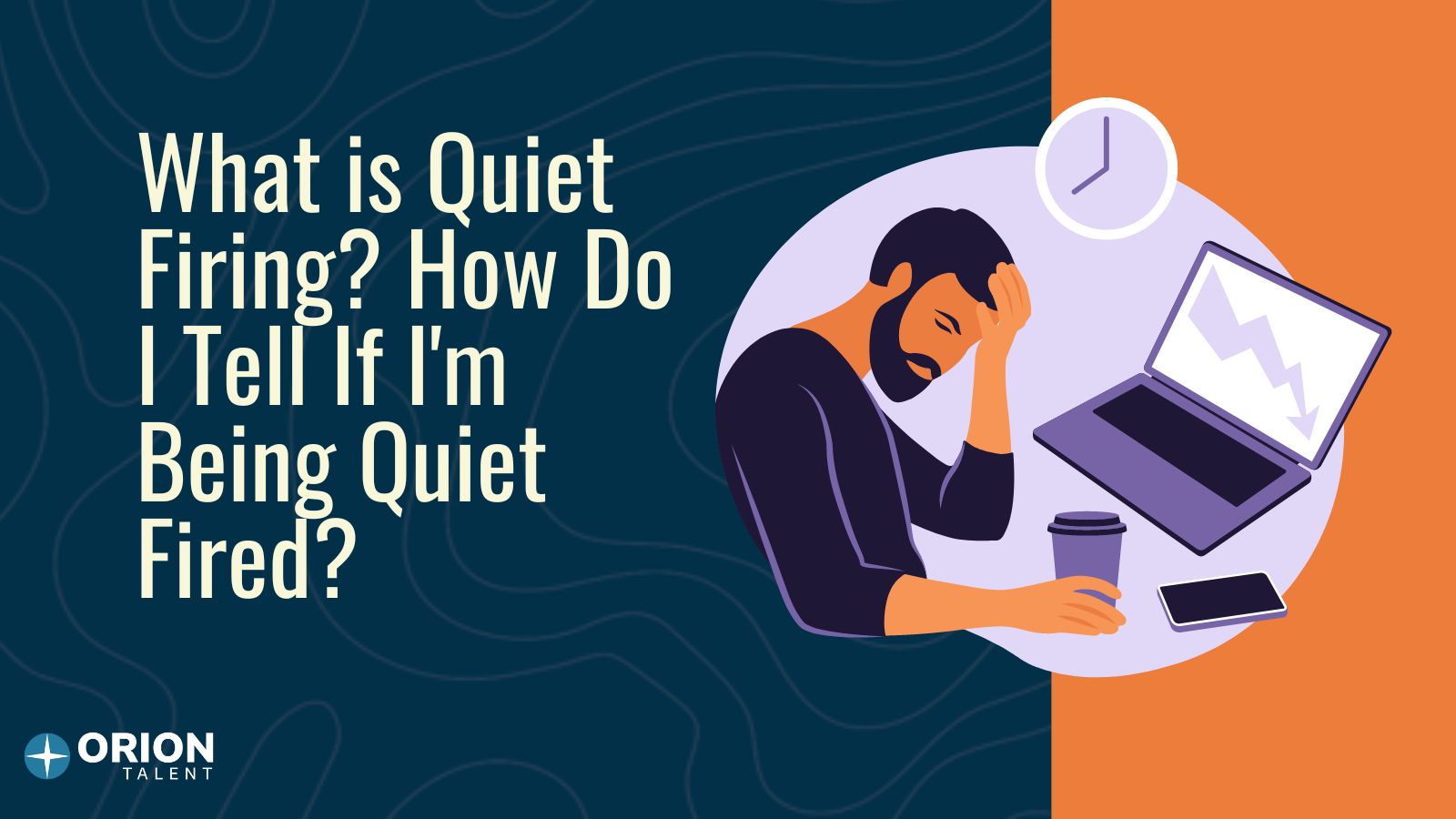
If you’re on the job search market, there is a good chance you’ve seen the term “quiet quitting.” However, it’s not the only trend that is starting to resurface - “quiet firing” is happening too, and it’s not necessarily new.
Read on to learn more about what quiet firing is, how to tell if you’re being quiet fired, and what to do if you think you are.
What is quiet firing?
Quiet firing refers to when an employer intentionally treats an employee in a less than favorable manner in order to encourage the employee to quit. It can also refer to when a manager has lost confidence in their employee’s work performance. Instead of giving the person direct feedback, many managers just simply hope that the person will move on from the company on their own.
The phrase “quiet firing” is somewhat new, but the concept is not - unfortunately, difficult work environments have always existed. While sometimes quiet firing is intentional, oftentimes employers don’t even realize that they are engaging in this behavior.
How is quiet firing related to quiet quitting?
Quiet quitting is essentially doing the bare minimum at your job. It refers to doing just enough to remain on the payroll, but letting others look for improvements and not striving to be better in your role.
Both major buzzwords, quiet firing is very different from quiet quitting. Instead of being an action (or lack thereof) by the employee, quiet firing is on the employer’s side.
What are the signs that you are being quiet-fired?
There are a variety of different signs that you are being quiet-fired, including personal development meetings with your manager being frequently canceled, a lack of coaching/feedback in your work performance, no individual recognition given, and more “busy” work instead of impactful, exciting projects.
Other signs that you are being quiet-fired include an unclear direction in your own work tasks and goals, low interest in your career growth from your manager, and withholding of promotions and/or pay increases.
What should you do if you think you are being quiet-fired?
If you think you are being quiet-fired, not all is lost. There are steps you can take to try and mend the situation. Remember that you have an expert grasp on your work history within a company and can identify the signs right away - you’ll notice if you’re getting passed up for a salary increase or aren’t getting feedback from your manager.
The best response is to be proactive. Schedule a time to speak with your manager to request feedback. Be transparent, and don’t be afraid to ask questions about your performance, such as “How am I doing on this project?” or “Should I be doing anything better?”.
In addition, be vocal about your goals and aspirations. Don’t be afraid to tell your manager if you’d really like to have a promotion, and ask if there are any gaps in your performance to try and achieve your goals. Make a point to show that you’re invested in the company and desire to grow within it.
How can you tell if a new company might be a quiet-firer?
There are many “red flags” to look out for when starting at a new company that go hand-in-hand with an organization that has a proclivity to quiet fire its employees. A toxic work environment where negative behaviors such as manipulation, bullying, yelling, etc. are intrinsic could indicate a company where quiet firing is the norm.
This leads to a lack of productivity, trust, high stress, and discrimination within the organization, and opportunities for employees to grow, thrive, and succeed are very limited or nonexistent.
What steps can I take to avoid companies that practice quiet firing?
The best action to take to avoid companies who have a history of quiet firing is to work with a trusted recruiting firm to find a new career. The companies that work with Orion Talent are actively seeking engaged, talented individuals to continue to grow their organization.
They desire to hire talent that is looking to advance within the company, and through their career development programs and other opportunities, create a work environment where it is encouraged. Stay tuned for our blog post next week on how to identify “green flags” within a company.
If you are looking for a new career, Orion Talent helps professionals and veterans find the best job opportunities across every industry. Find out more about our services and register with us today to get started.
Archives
- January 2026
- December 2025
- November 2025
- October 2025
- September 2025
- August 2025
- July 2025
- June 2025
- May 2025
- April 2025
- March 2025
- February 2025
- October 2024
- May 2024
- March 2024
- February 2024
- January 2024
- December 2023
- November 2023
- October 2023
- September 2023
- August 2023
- July 2023
- June 2023
- May 2023
- April 2023
- March 2023
- February 2023
- January 2023
- December 2022
- November 2022
- October 2022
- September 2022
- August 2022
- July 2022
- June 2022
- May 2022
- April 2022
- March 2022
- February 2022
- January 2022
- December 2021
- November 2021
- October 2021
- September 2021
- August 2021
- July 2021
- June 2021
- May 2021
- April 2021
- March 2021
- February 2021
- January 2021
- December 2020
- November 2020
- October 2020
- September 2020
- August 2020
- July 2020
- June 2020
- May 2020
- April 2020
- March 2020
- February 2020
- January 2020
- December 2019
- November 2019
- October 2019
- September 2019
- August 2019
- July 2019
- June 2019
- May 2019
- April 2019
- March 2019
- February 2019
- January 2019
- December 2018
- November 2018
- October 2018
- September 2018
- August 2018
- July 2018
- June 2018
- May 2018
- April 2018
- March 2018
- February 2018
- January 2018
- December 2017
- November 2017
- October 2017
- September 2017
- August 2017
- July 2017
- June 2017
- May 2017
- March 2017
- February 2017
- January 2017
 RSS Feed
RSS Feed




















